高考英语最新情态动词知识点解析(1)
高三英语高考语法知识点归纳总结情态动词和虚拟语气情态动词
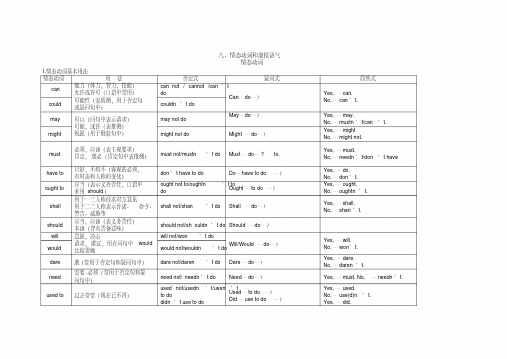
八、情态动词和虚拟语气情态动词I.情态动词基本用法情态动词用法否定式疑问式简答式can 能力(体力,智力,技能)允许或许可(口语中常用)可能性(表猜测,用于否定句或疑问句中)can not / cannot /can’tdoCan…do…?Yes,…can.No,…can’t.could couldn’t domay 可以(问句中表示请求)可能,或许(表推测)祝愿(用于倒装句中)may not doMay…do…?Yes,…may.No,…mustn’t/can’t.might might not do Might…do…?Yes,…might No,…might not.must 必须,应该(表主观要求)肯定,想必(肯定句中表推测)must not/mustn’t do Must…do…? to.Yes,…must.No,…needn’t/don’t havehave to 只好,不得不(客观的必须,有时态和人称的变化)don’t have to do Do…have to do…?Yes,…do.No,…don’t.ought to 应当(表示义务责任,口语中多用should)ought not to/oughtn’t todoOught…to do…?Yes,…ought.No,…oughtn’t.shall 用于一三人称征求对方意见用于二三人称表示许诺、命令、警告、威胁等shall not/shan’t do Shall…do…?Yes,…shall.No,…shan’t.should 应当,应该(表义务责任)本该(含有责备意味)should not/sh ouldn’t do Should…do…?will 意愿,决心请求,建议,用在问句中would比较委婉will not/won’t doWill/Would…do…?Yes,…will.No,…won’t.would would not/wouldn’t dodare 敢(常用于否定句和疑问句中)dare not/daren’t do Dare…do…?Yes,…dare. No,…daren’t.need 需要,必须(常用于否定句和疑问句中)need not/needn’t do Need…do…?Yes,…must. No,…needn’t.used to 过去常常(现在已不再)used not/usedn’t/usen’tto dodidn’t use to doUsed…to do…?Did…use to do…?Yes,…used.No,…use(d)n’t.Yes,…did.No,…didn’t. II.情态动词的重点知识表示“能力、许可”的can和may 表示能力的情态动词用can/couldA computer_____think for itself; it must be told what to do.A.can’tB.must n’tC.may notD.might not表示许可时用may/might ,can/could 都可以,但在问句中用could…?或might…?以使口气委婉客气,其回答一定要用can或may,以使回答口气明确(must表示一定,必须,mustn’t表示禁止,不许可)。
高考英语情态动词语法知识点与用法
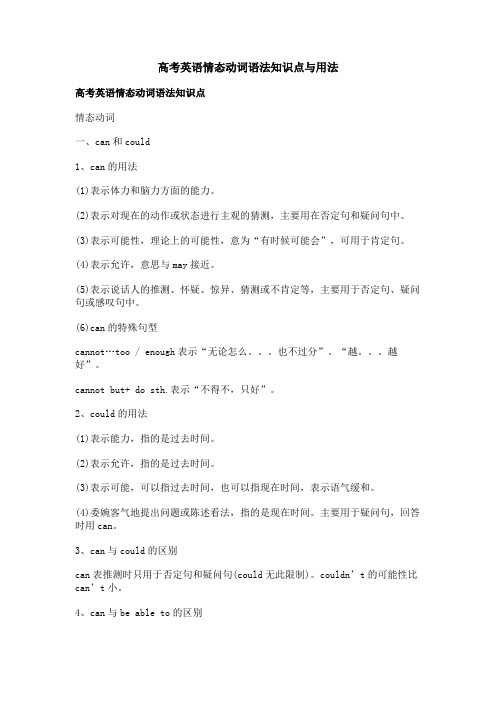
高考英语情态动词语法知识点与用法高考英语情态动词语法知识点情态动词一、can和could1、can的用法(1)表示体力和脑力方面的能力。
(2)表示对现在的动作或状态进行主观的猜测,主要用在否定句和疑问句中。
(3)表示可能性,理论上的可能性,意为“有时候可能会”,可用于肯定句。
(4)表示允许,意思与may接近。
(5)表示说话人的推测、怀疑、惊异、猜测或不肯定等,主要用于否定句、疑问句或感叹句中。
(6)can的特殊句型cannot…too / enough表示“无论怎么。
也不过分”。
“越。
越好”。
cannot but+ do sth.表示“不得不,只好”。
2、could的用法(1)表示能力,指的是过去时间。
(2)表示允许,指的是过去时间。
(3)表示可能,可以指过去时间,也可以指现在时间,表示语气缓和。
(4)委婉客气地提出问题或陈述看法,指的是现在时间。
主要用于疑问句,回答时用can。
3、can与could的区别can表推测时只用于否定句和疑问句(could无此限制)。
couldn’t的可能性比can’t小。
4、can与be able to的区别(1)现在时:无区别,但后者不常用。
(2)完成时;can没有完成时,此时要用have(has,had)been able to。
(3)将来时:can没有将来时,要用will be able to。
(4)过去时:could表示一般能力,was/were able to 表示在具体场合通过努力成功做成某事的能力。
二、may 和might1、may的用法(1)表示询问或说明一件事可不可以做。
(2)表示一件事或许会发生或某种情况可能会存在,通常用在肯定句和否定句中。
注意:表示可能性时,can’t语气强,表示“不可能”,may not语气弱,表示“可能不”。
2、might的用法(1)表示询问或允许,指的是过去时间。
(2)表示可能发生的事,可以指过去时间,也可以指现在时间,语气更加不肯定,可能性比may小一些。
高考情态动词分类详解
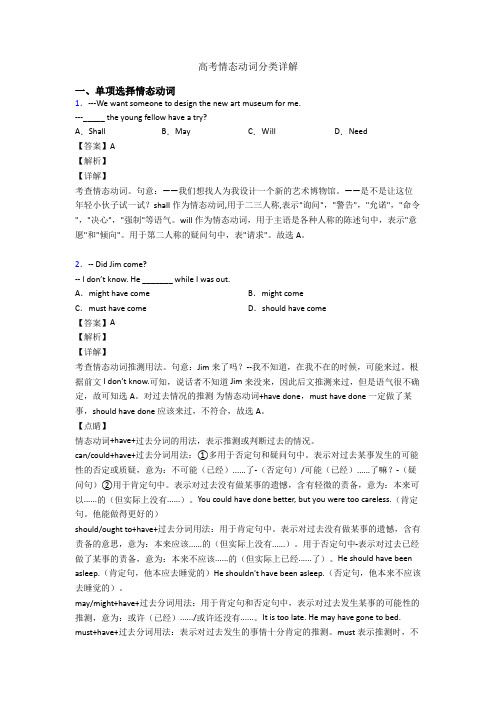
高考情态动词分类详解一、单项选择情态动词1.---We want someone to design the new art museum for me.---_____ the young fellow have a try?A.Shall B.May C.Will D.Need【答案】A【解析】【详解】考查情态动词。
句意:——我们想找人为我设计一个新的艺术博物馆。
——是不是让这位年轻小伙子试一试?shall作为情态动词,用于二三人称,表示"询问","警告","允诺","命令","决心","强制"等语气。
will作为情态动词,用于主语是各种人称的陈述句中,表示"意愿"和"倾向"。
用于第二人称的疑问句中,表"请求"。
故选A。
2.-- Did Jim come?-- I don’t know. He _______ while I was out.A.might have come B.might comeC.must have come D.should have come【答案】A【解析】【详解】考查情态动词推测用法。
句意:Jim来了吗?--我不知道,在我不在的时候,可能来过。
根据前文I don’t know.可知,说话者不知道Jim来没来,因此后文推测来过,但是语气很不确定,故可知选A。
对过去情况的推测为情态动词+have done,must have done 一定做了某事,should have done 应该来过,不符合,故选A。
【点睛】情态动词+have+过去分词的用法,表示推测或判断过去的情况。
can/could+have+过去分词用法:①多用于否定句和疑问句中。
表示对过去某事发生的可能性的否定或质疑,意为:不可能(已经)......了-(否定句)/可能(已经)......了嘛?-(疑问句)②用于肯定句中。
高考英语情态动词和虚拟语气考点总结及真题解析

考点13 情态动词和虚拟语气【命题解读】英语中常用的情态动词主要有can,could,may,might,must,will,would,shall,should,ought to,dare,need,used to,had better等。
在学习情态动词时应注意以下几点:同一情态动词表示不同的意义的情况;情态动词后跟各种形式的用法;尤其要注意"情态动词+完成式"是高考中的重点所在。
对虚拟语气的考查重点在于根据句子的语境灵活多样地运用虚拟语气,宾语从句中虚拟语气的应用,交际用语中为表示委婉而使用的虚拟语气,含蓄条件句中的虚拟语气,以及特殊句型中的虚拟语气等。
【命题预测】情态动词是2021年各地高考试题中的必考项目,每年高考单独命题区的单项填空必有一道考查情态动词的项目。
新课标卷主要在语法填空和短文改错中考查。
考点依次是:推测(可能性)→请求/允许→必要性→特殊用法。
试题的立意不偏不怪,但有效信息越来越隐蔽,语境越来越真实,考查角度越来越细致,这些因素在很大程度上增加了试题的难度。
情态动词和虚拟语气与动词的时态和语态相结合的考查是近年来高考的趋势。
【复习建议】情态动词:1. 掌握情态动词的基本用法;2. 掌握情态动词表达"情感、态度、语气等"方面的用法。
虚拟语气:1. 掌握虚拟语气的基本用法;2. 掌握含蓄虚拟条件句的用法;3. 掌握主从句时间不一致的虚拟条件句的用法;情态动词考向一情态动词的基本用法1)can,could与be able to1.表示能力,意为"能,会"。
☞Many people can use the computer.许多人会用电脑。
☞If you have a good sleep,you will be able to work out this problem.如果你好好睡一觉,你将能够解出这道题。
☞I could have worked out the problem,but I was too nervous.我本来可以解决这个问题,但我太紧张了。
高考英语新情态动词知识点

高考英语新情态动词知识点在高考英语中,情态动词一直是一个重要的语法知识点。
近年来,对于新情态动词的考查也逐渐增多。
新情态动词包括 ought to、have to、be supposed to 等,它们在用法和语义上都有其独特之处。
首先,我们来看看 ought to。
ought to 表示“应该”,语气比 should 稍强。
它常用于表示责任、义务或正确的做法。
例如:“You ought to study harder if you want to get good grades”(如果你想取得好成绩,你应该更努力学习。
)需要注意的是,ought to 的否定形式是 ought not to,疑问形式是将 ought 提前。
接着是 have to。
have to 强调由于外部的客观原因而“不得不”做某事。
它有人称、数和时态的变化。
比如:“I have to go now because it's getting late”(我现在得走了,因为天色已晚。
)“She had to stay athome yesterday because she was ill”(她昨天不得不待在家里,因为她生病了。
)与 must 不同,must 通常表示主观上的“必须”,而 have to 更侧重于客观上的无奈。
再来说说 be supposed to。
这个短语有多种含义,常见的有“应该;被期望”。
“You are supposed to arrive on time”(你应该准时到达。
)它还可以表示“本应;本该”,用来表示某事没有按照预期发生。
例如:“The train was supposed to leave at 9 o'clock, but it's delayed”(火车本该 9 点出发,但晚点了。
)在具体的语境中,这些新情态动词的运用需要我们仔细分辨。
比如,在表达建议时,ought to 可能更合适;在强调客观条件限制时,have to 更为准确;而 be supposed to 则在描述期望和规定方面用得较多。
高考英语二轮复习情态动词和虚拟语气考点讲解含解析
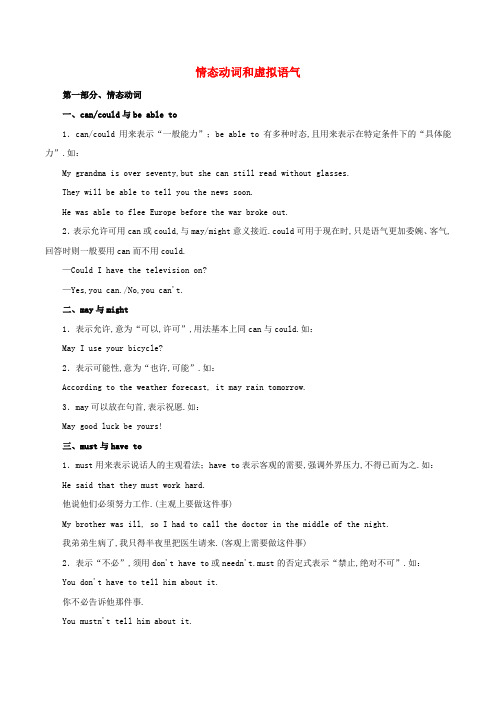
情态动词和虚拟语气第一部分、情态动词一、can/could与be able to1.can/could用来表示“一般能力”;be able to有多种时态,且用来表示在特定条件下的“具体能力”.如:My grandma is over seventy,but she can still read without glasses.They will be able to tell you the news soon.He was able to flee Europe before the war broke out.2.表示允许可用can或could,与may/might意义接近.could可用于现在时,只是语气更加委婉、客气,回答时则一般要用can而不用could.—Could I have the television on?—Yes,you can./No,you can't.二、may与might1.表示允许,意为“可以,许可”,用法基本上同can与could.如:May I use your bicycle?2.表示可能性,意为“也许,可能”.如:According to the weather forecast, it may rain tomorrow.3.may可以放在句首,表示祝愿.如:May good luck be yours!三、must与have to1.must用来表示说话人的主观看法;have to表示客观的需要,强调外界压力,不得已而为之.如:He said that they must work hard.他说他们必须努力工作.(主观上要做这件事)My brother was ill, so I had to call the doctor in the middle of the night.我弟弟生病了,我只得半夜里把医生请来.(客观上需要做这件事)2.表示“不必”,须用don't have to或needn't.must的否定式表示“禁止,绝对不可”.如:You don't have to tell him about it.你不必告诉他那件事.You mustn't tell him about it.你绝不能告诉他那件事.—Must we do it now?我们必须现在做吗?—No, you needn't.不,你们不必.四、shall1.用于第一、第三人称的疑问句中,用来征求对方的意见或请求指示.如:What shall he do next?他下一步干什么呢?2.用于第二、第三人称的陈述句中,表示说话人的意愿,有“命令、警告、允诺、威胁、强制”等意思.如:He shall stay in bed.他必须躺在床上.You shall have it back next week.下周一定还你.He says he won't go, but I say he shall.他说他不去,但我说他必须去.五、will与would1.will用于各种人称,表示“意志、意愿”或“决心”等.如:If you will keep your watch half an hour slow, it is hardly surprising that you are late for your appointments.如果你想要让你的表慢半个小时,你约会时迟到就不足为怪了.2.will表示习惯性的动作,有“总是,惯于”的含义.如:An Englishman will usually show you the way in the street.英国人通常是会在街上给你指路的.3.would可表示过去反复发生的动作.如:On Sundays he would get up early and go fishing.星期天他总是早起去钓鱼.六、should与ought to1.should表示“建议”或“劝告”,有“应该”之意.如:You should learn from each other.2.ought to表示根据某种义务或必要“应当”做某事.如:Everyone ought to obey the traffic regulations.3.should和ought to也可用来表示推测,意为“想必会……”.如:—When can I come for the photos? I need them tomorrow afternoon.—They should be ready by 1200.七、情态动词表示推测1.can用于肯定句中表示客观的可能性,意为“有时会”;用于疑问句中可以表示推测,意为“可能”,有时表示一种惊讶的语气;用于否定句中也可以表示推测,can't意为“不可能”,语气很强烈.It is usually warm in my hometown in March, but it can be rather cold sometimes.我的家乡在三月份通常很暖和,但有时候也会相当冷.Mr. Bush is on time for everything. How can it be that he was late for the meeting?布什先生做什么事情都很准时,他怎么可能开会迟到呢?—Let's visit Tom together, Stephen.—There's no need to do so. He can't be at home, because I saw him board the flight to Beijing this morning.——Stephen,咱们一起拜访汤姆吧.——没必要这样做.他一定不在家,因为今天早晨我看见他登上了飞往北京的航班.2.may/might用于肯定句中可以用来表示不十分肯定的推测,意为“有可能”;用于否定句中也可以表示推测,may not意为“可能不”,表示一种不太确定的语气.The traffic is heavy these days. I might arrive a bit late, so could you save me a place?这些天交通很繁忙,我可能会来晚一点,请你帮我保留个位置好吗?3.must表示推测时只能用于肯定句中,意为“一定,必定”,表示十分肯定的语气(在疑问句中或否定句中要用can/could).—It's the office! So you must know eating is not allowed here.—Oh, sorry.——这是办公室!所以你一定知道这里不许吃东西.——噢,对不起.4.should用来表示推测时意为“应该”,即含有“按道理来说应当如此”的意思.There shouldn't be any difficulty about passing the road test since you have practiced a lotin the driving school.因为你在驾校训练了这么多,通过路考应该没什么困难.八、“情态动词+have done”结构1.should/ought to+have done,表示“过去本应该做而(实际)没有做的事情”,含有责备或遗憾的语气,意为“本应该……”.其否定形式为“should not/ought not to have+done”,表示某种行为本不该发生但实际上发生了.I shouldn't have watched that movie—it'll give me horrible dreams.我本不应该看那部电影——它会令我做噩梦.You ought to have come to the party yesterday, but why didn't you come?昨天你本来应该参加聚会的,可是你为什么不来?2.must+have done,用于肯定句,表示“过去一定做过某事”,表示一种很有把握的推测.注意,对过去发生的情况的否定推测常用“can't/couldn't+have done”表示.—Ye Shiwen won two gold medals in London Olympic Games.—She must have gone through tough training.——叶诗文在伦敦奥运会获得了两枚金牌.——她肯定受到严格的训练.—Do you know where David is? I couldn't find him anywhere.—Well. He can't have gone far—his coat's still here.——你知道大卫在哪里吗?我到处找不到他.——大卫的上衣还在这里,因此他肯定没走远.3.needn't+have done,表示“过去没有必要做某事,但实际上做了某事”.Mark needn't have hurried. After driving at top speed, he arrived half an hour early.马克本没必要那么匆忙.他以最快速度开车,结果早到了半个小时.4.may/might+have done,表示对过去情况的一种不太有把握的可能性的推测,表示“可能已做了某事……”,否定句表示“可能还没有……”.Sorry, I'm late. I might have turned off the alarm clock and gone back to sleep again.对不起,我迟到了.我可能把闹钟关掉后又睡着了.5.could+have done表示“过去本来可以做某事,但实际上没有做”;can/could+have done表示“过去可能做了某件事”.I could have saved the poor rabbit, but I didn't have the right drugs with me at that moment.我本来可以拯救那只可怜的兔子的,可是我当时没有合适的药品.第二部分、虚拟语气一、虚拟语气在虚拟条件句中的用法1.在具体运用中,条件从句中有时可省略if而采用倒装结构.如:Had it not been for your help, we wouldn't have achieved so much.2.介词without/but for、连词but、副词otherwise常用来表示某种假设条件.如:I wouldn't have made such rapid progress without your help.3.有时候从句动作和主句动作发生的时间不一致,这时谓语动词的形式要根据各自的时间来调整.如:If the weather had been more favourable, the crops would be growing still better.二、“should+动词原形”表示的虚拟语气这一类型常见词有“一坚持(insist)、二命令(order, command)、三建议(advise, suggest, propose)、四要求(request, require, demand, desire)”.以上词及其派生名词所接的名词性从句都使用“(should +)动词原形”的虚拟语气.①Jane's pale face suggested that she was ill, and her mother suggested that she(should) havea medical examination.简苍白的脸色表明她病了,她母亲建议她去检查身体.②She insisted that the man had stolen her car and that he(should) be sent to prison.她坚持说那个男人偷了她的车,并坚决要求他坐牢.三、特殊句式中的虚拟语气If only/It's (high) time (that)...wish/would rather/as if等固定句式要求用相应的虚拟语气表达形式.①I wish I could fly.真希望我能飞.②I would rather you came tomorrow.我宁愿你明天来.③If only I had taken your advice!要是听从了你的建议该多好啊!高频考点一、考查情态动词例1.(2018·北京卷)In today’s information age, the loss of data _________ cause serious problems for a company.A. needB. shouldC. canD. must【答案】C【解析】考查情态动词.句意:在今天的信息时代,数据的丢失有时会对一个公司造成严重的问题.数据丢失造成严重问题是客观上会发生的情况,即“客观可能性”,故该空应用情态动词can.C选项正确.其余情态动词均没有该用法.need需要;should应该,竟然;must必须,肯定.【变式探究】—Can’t you stay a little longer?—It’s getting late. I reall y _____go now, My daughter is home alone.A .mayB .canC . mustD .dare【答案】C【解析】句意:——你不能再多待会儿吗?——很晚了,我必须得走了.我女儿一个人在家.A. may可能,可以,也许;B. can能,会;C. must必须,必然要,必定会;D. dare敢,胆敢.结合句意,故选C.【变式探究】________ I have a word with you? It won’t take long.A. CanB. MustC. ShallD. Should【答案】A【解析】本题考察的是情态动词基本意义辨析.Can能够,可能;must必须,一定;非得;shall将要;should应该;句意:我可以和你谈谈吗?不会花很多时间的.根据句意可知本题使用can I…?表示询问对方是否允许.如:Can I use your dictionary?我可以使用你的字典吗?故A正确.高频考点二、考查情态动词的用法例2. (2018·天津卷) I can't find my purse. I___________ it in the supermarket yesterday, but I'm not sure.A. should leaveB. must have leftC. might leaveD. could have left【答案】D【解析】考查情态动词表推测.句意:我不能找到我的钱包了,昨天我有可能把它落到超市了,但我不确定.根据句中时间状语yesterday可知,是对过去事情的推测,故用情态动词+ have done,再根据后句but I’m not sure.可知,此推测为不能肯定的推测,故用情态动词could,表示“可能”.故选D.【变式探究】(2017•天津)My room is a mess, but I __________clean it before I go out tonight.I can do it in the morning.A. daren’tB. shouldn’tC. needn’tD. mustn’t【答案】C【解析】句意:我的房间很乱,但是在今晚我出去之前不需要打扫,我可以明天早晨再打扫.A.不敢;B.不应该;C不需要;D.不许.根据句意,故选C.【变式探究】Why didn't you tell me about your trouble last week?If you ________(tell)me,I could have helped.【答案】had told【解析】句意:上个星期你为什么不告诉我你的麻烦事?如果你告诉我了,我就能帮你.根据句意和相关信息判断,条件句表示与过去事实相反的假设,此时从句用过去完成时,主句谓语用“情态动词+have done”形式.【变式探究】I ______ have worried before I came to the new school, for my classmates here are very friendly to me.A. mightn’tB. mustn’tC. needn’tD. couldn’t【答案】C【解析】句意:我来新学校之前本没有必要担心,因为在这里我的同学对我非常友好.needn’t have done本没有必要做某事,表示实际上已经做了某事.根据句意可知选C.高频考点三、考查虚拟语气例3.(2019·天津卷)The workers were not better organized, otherwise they ________ the task in half the time.A.accomplished B.had accomplishedC.would accomplish D.would have accomplished【答案】D【解析】考查虚拟语气.句意:工人们没有被组织好,否则的话他们会用那一半的时间完成任务的.此处otherwise表达了一种含蓄虚拟;otherwise前的内容所述的是过去的事实,相当于if引导的条件状语从句“If the workers had been better organized”,因此后半部分应用“主语+would have done sth.”的结构.故选D.【举一反三】【2018·江苏】It’s strange that he _______have taken the books without the owner’s permission.A. wouldB. shouldC. couldD. might【答案】B【解析】考查虚拟语气.句意:真奇怪,他竟然没有主人的允许就拿走了这些书.在句型”It is important/necessary/strange/impossible/natural that...”中,其中由that引导的主语从句通常用“should+动词原形”这样的虚拟语气,其中的should可以省略.故选B.【变式探究】(2017·北京)If the new safety system _______ to use, the accident would never have happened.A. had been putB. were putC. should be putD. would be put【答案】A【解析】句意:如果这个新的安全系统被投入使用过的话,这个事故就不会发生了.根据主句确定是对过去情况的虚拟,所以从句谓语用had done形式,此外根据句意可知是被动,用被动语态,故A项是正确的.【变式探究】________(have)the governments and scientists not worked together,AIDSrelated deaths would not have fallen since their highest in 2005.【答案】Had【解析】句意:如果政府和科学家不共同努力,与艾滋病相关的死亡就不会从2005年的最高点下降.这是一个省略了从属连词if的虚拟语气句,使用了倒装句式.根据主句的would not have fallen可知,这里是表示过去的虚拟语气,所以用had.【变式探究】Without his wartime experiences, Hemingway____ his famous novel A Farewell to Arms.A.didn’t writeB. hadn’t writtenC. wouldn’t w riteD. wouldn’t have written【答案】D【解析】句意:没有他战时的经验,海明威就不可能写出著名的小说永别了武器.根据without his wartime experience没有战时的经历,可知表示对于过去的否定猜测,故主句用would have done,因此选D 项.1.(2019·天津卷)The workers were not better organized, otherwise they ________ the task in half the time.A.accomplished B.had accomplishedC.would accomplish D.would have accomplished【答案】D【解析】考查虚拟语气.句意:工人们没有被组织好,否则的话他们会用那一半的时间完成任务的.此处otherwise表达了一种含蓄虚拟;otherwise前的内容所述的是过去的事实,相当于if引导的条件状语从句“If the workers had been better organized”,因此后半部分应用“主语+would have done sth.”的结构.故选D.2.(2019·江苏卷)What a pity! You missed the sightseeing, or we ________ a good time together.A.had B.will haveC.would have had D.had had【答案】C【解析】考查虚拟语气.句意:多么遗憾!你错过了这次游览.否则,我们就可以一起度过一段愉快的时光.根据关键词or可知,这里表示与过去的事实相反,谓语动词应用would/could/should/might+have done.1.【2018·江苏】 There is a good social life in the village, and I wish I _______ a second chance to become more involved.A. hadB. will haveC. would have hadD. have had【答案】A【解析】考查虚拟语气.句意:在这个村里有很好的社交生活,并且我希望我再有机会去更多的参与.本题考查wish引导的宾语从句,表示与现在事实相反的愿望,所以从句用一般过去时.故选A.2.【2018·江苏】It’s strange that he _______have taken the books without the owner’s permission.A. wouldB. shouldC. couldD. might【答案】B【解析】考查虚拟语气.句意:真奇怪,他竟然没有主人的允许就拿走了这些书.在句型”It isimport ant/necessary/strange/impossible/natural that...”中,其中由that引导的主语从句通常用“should+动词原形”这样的虚拟语气,其中的should可以省略.故选B.3.(2018·天津卷) I can't find my purse. I___________ it in the supermarket yesterday, but I'm not sure.A. should leaveB. must have leftC. might leaveD. could have left【答案】D【解析】考查情态动词表推测.句意:我不能找到我的钱包了,昨天我有可能把它落到超市了,但我不确定.根据句中时间状语yesterday可知,是对过去事情的推测,故用情态动词+ have done,再根据后句but I’m not sure.可知,此推测为不能肯定的推测,故用情态动词could,表示“可能”.故选D.4.(2018·北京卷)In today’s information age, the loss of data _________ cause serious problems for a company.A. needB. shouldC. canD. must【答案】C【解析】考查情态动词.句意:在今天的信息时代,数据的丢失有时会对一个公司造成严重的问题.数据丢失造成严重问题是客观上会发生的情况,即“客观可能性”,故该空应用情态动词can.C选项正确.其余情态动词均没有该用法.need需要;should应该,竟然;must必须,肯定.5.(2018·北京卷)They might have found a better hotel if they _________ a few more kilometers.A. droveB. would driveC. were to driveD. had driven【答案】D【解析】考查虚拟语气.句意:如果他们多开几公里的话,他们也许会找到一个更好的旅馆.由“they might have found a better hotel”可知,该句是表示对过去的虚拟.if ____ a few more kilometers是条件句部分,表示对过去的虚拟,条件句部分要用过去完成时态,故D选项正确.1.(2017·北京)Samuel, the tallest boy in our class, ______ easily reach the books on the top shelf.A. mustB. shouldC. canD. need【答案】C【解析】A. must 必须 B. should 应该 C. can 能 D. need 需要.句意:Samuel,我班最高的男生,能很轻松地够着书架顶上的书,此处需要一个表示能力的词,故用can,答案为C.2.(2017•天津)My room is a mess, but I __________clean it before I go out tonight. I can do it in the morning.A. daren’tB. shouldn’tC. needn’tD. mustn’t【答案】C【解析】句意:我的房间很乱,但是在今晚我出去之前不需要打扫,我可以明天早晨再打扫.A.不敢;B.不应该;C不需要;D.不许.根据句意,故选C.3.(2017•江苏) _______ not for the support of the teachers, the student could not overcome her difficulty.A. It wereB. Were itC. It wasD. Was it【答案】B【解析】考查虚拟语气和倒装.虚拟语气中,be动词统一用were;虚拟语气的省略形式主要是把if省略,同时把were/should/had提前,即Were /Should/ Had I...,故选B.句意:要不是老师们的支持,该生是无法克服她自己的困难的.4.(2017·江苏卷) ____________ not for the support of the teachers, the student could not overcome her difficulty.A. It wereB. Were itC. It wasD. Was it【答案】B【解析】考查虚拟语气的省略.虚拟语气中,be动词统一用were;虚拟语气的省略形式主要是把if省略,同时把were/should/had提前,即Were /Should/ Had I...,故选B.5.(2017•江苏) _______ not for the support of the teachers, the student could not overcomeher difficulty.A. It wereB. Were itC. It wasD. Was it【答案】B【解析】考查虚拟语气和倒装.虚拟语气中,be动词统一用were;虚拟语气的省略形式主要是把if省略,同时把were/should/had提前,即Were /Should/ Had I...,故选B.句意:要不是老师们的支持,该生是无法克服她自己的困难的.6.(2017·北京)If the new safety system _______ to use, the accident would never have happened.A. had been putB. were putC. should be putD. would be put【答案】A【解析】句意:如果这个新的安全系统被投入使用过的话,这个事故就不会发生了.根据主句确定是对过去情况的虚拟,所以从句谓语用had done形式,此外根据句意可知是被动,用被动语态,故A项是正确的.1.(2016·浙江,15)________(have)the governments and scientists not worked together,AIDSrelated deaths would not have fallen since their highest in 2005.【答案】Had【解析】句意:如果政府和科学家不共同努力,与艾滋病相关的死亡就不会从2005年的最高点下降.这是一个省略了从属连词if的虚拟语气句,使用了倒装句式.根据主句的would not have fallen可知,这里是表示过去的虚拟语气,所以用had.2.(2016·浙江,17)George can't ________(go)too far.His coffee is still warm.【答案】have gone【解析】句意:乔治不可能走得太远了.他的咖啡仍然是温的.can't have done是对过去的否定推测.3.(2016·北京,34)Why didn't you tell me about your trouble last week?If you ________(tell)me,I could have helped.【答案】had told【解析】句意:上个星期你为什么不告诉我你的麻烦事?如果你告诉我了,我就能帮你.根据句意和相关信息判断,条件句表示与过去事实相反的假设,此时从句用过去完成时,主句谓语用“情态动词+have done”形式.。
高考英语语法考点解读:情态动词和虚拟语气

情态动词主要用来表示说话人的情感、态等,是中英语语法的重点,也是高考的热点,是单项填空必考的一个知识点。
情态动词在近五高考中主要考查四点:情态动词表示推测和可能性的用法;情态动词与虚拟语气;情态动词表达“情感、态、语气等”;情态动词表示“必要性”等方面的用法。
虚拟语气的考点主要集中在名词性从句、条件句中的用法,以及错综条件句中虚拟语气的应用。
一、情态动词表推测的用法headmaster.①That maynot be true.①He couldn'thavediscovered thetruth.注意:should (ought to)表示推测是高考考查的重点和难点。
如:—When can I come for the photos?I need them tomorrow afternoon.—They ________ be ready by 12:00.A.can B.should C.might D.need【解析】B A项表示推测时常用于否定句和疑问句中。
C项表示推测语气不太肯定。
should意为“按理说,理应”,既回答了顾客的询问,不失礼貌,又为照片有可能尚未洗好,顾客到时取不到留下了回旋的余地,体现了店主的精明与用词经过仔细推敲。
二、情态动词的其他用法1.can, could, may, might2.must, should3. need, dare4.shall/will/would4.shall/will/would4.shall/will/would二、情态动词+have done四、虚拟语气虚拟语气表示说话人所说的话不是事实,而是一种假设、愿望、怀疑或推测。
1.虚拟语气在条件句中的用法If it were to rain tomorrow, I should not drive my car. 如果明天下雨的话,我就不开车了。
(明天的情况还不知道)If I had done it in time, I should have had a good time. 如果我及时做的话,日子就好过多了。
高考英语情态动词解析

高考英语情态动词解析情态动词的全称是情态助动词,助动词则分为两种:差不多助动词和情态助动词。
什么缘故要细分一下呢?因为它们是有区别的:差不多助动词有三个:be, have, do情态动词有大约14个:may, might; can, could; will, would; shall, sh ould;must, need, dare, used to, ought to. had better构成时态或语态的助动词,提早或否定时显现的动词。
换句话说确实是:助动词是当形式需要它的时候才显现,不该它显现就哪儿凉快哪儿呆着。
比如由于时态或语态的要求,比如疑问句或否定句的要求等等,需要它的时候才显现,不需要的时候并没它们什么事。
它们的区别:1、每个情态动词都有差不多意义,差不多助动词则没有,只具有语法作用。
2、情态动词后面接原形动词,也确实是秃头不定式;助动词要看时态或语态等等情形变化。
3、情态动词没有人称和数的变化,而助动词则有。
4、只有现在和过去两种形式,但能够表示过去、现在和今后时刻。
5、情态动词没有非谓语动词形式,而助动词有。
巩固练习:1、____ you understand the different kinds of English these people are using?A. WillB. CanC. May2、You ____ be Carol. You haven’t changed a bit after all these ye ars.A. mustB. mightC. should3、—I think I’ll give Bob a ring.—You ____. You haven’t been in touch with him for ages.A. willB. mayC. should4、Although you ____ find bargains in London, it’s not generally a cheap place to shop.A. shouldB. needC. can5、It is usually warm in my hometown in March, but it ____ be rat her cold sometimes.A. mightB. canC. must6、If you ____ go, at least wait until the storm is over.A. shouldB. mustC. may7、—What are you going to do this Saturday?—I’m not sure, but I ____ go tothe Rolling Stone concert.A. mayB. mustC. can8、One of our rules is that every student ____ wear school uniform while at school.A. shallB. needC. may9、—I’ve prepared all kinds of food for the picnic.—Do you mean we ____ bring anything with us?A. can’tB. mustn’tC. needn’t10、Days later, my brother called to say he was all right, but ___ no t say where he was.A. wouldB. mayC. can情态动词习题解析巩固练习:1、____ you understand the different kinds of English these people are using?A. WillB.CanC. May2、You ____ be Carol. You haven’t changed a bit after all these ye ars.A.mustB. mightC. should3、—I think I’ll give Bob a ring.—You ____. You haven’t been in touch with him for ages.A. willB. mayC.should4、Although you ____ find bargains in London, it’s not generally a cheap place to shop.A. shouldB. needC.can5、It is usually warm in my hometown in March, but it ____ be rat her cold sometimes.A. mightB.canC. must6、If you ____ go, at least wait until the storm is over.A. shouldB.mustC. may7、—What are you going to do this Saturday?—I’m not sure, but I ____ go to the Rolling Stone concer t.A.mayB. mustC. can8、One of our rules is that every student ____ wear school uniform while at school.A.shallB. needC. may9、—I’ve prepared all kinds of food for the picnic.—Do you mean we ____ bring anything with us?A. can’tB. mustn’tC.needn’t10、Days later, my brother called to say he was all right, but ___ no t say where he was.A.wouldB. mayC. can。
专题03 情态动词和虚拟语气(解析版)(全国通用版)-高考英语复习

专题03 情态动词和虚拟语态情态动词★ 情态动词:can, could, may, might, must, ought to, shall, will, would, need ,dare1. 表示推测的情态动词1.1基本原则:1.1.2 对现在或将来情况推测,用情态动词+do / be / be doing…对过去的推测,用情态动词+have done / been…1.1.3表示肯定推测的情态动词,按可能性由大到小依次为:must> should / oughtto>may>might>could1.1.4否定推测,按语气由强到弱依次为:can’t / couldn’t(根本不可能)>may not> mightnot/could not(可能不)。
1.2 具体用法:1.2.1 must be表示推测,意为“一定是……” 只用于肯定句中must have done意为“一定做过某事或某事肯定发生了” 并且有前文铺垫e.g. Listen! There must be some children in the room.The road is wet. It must have rained last night.1.2.2 should (not) / ought (not) to在中表示根据常规或常识推测,表示“某事应该或不应该发生”e.g. It is nearly 7 o’clock. Jack should be here at any moment.You shouldn’t be texting in the class now. We are having a lesson.(should not 含有责备之意)1.2.3 can, could表达推测时,一般用于疑问句和否定句中;can用于肯定句中表示一种理论上的可能性,意为“有时候会…”,并不牵涉是否真的会发生;could用于肯定句中,语气比may/ might更弱。
高考英语情态动词知识点真题汇编含答案解析(1)
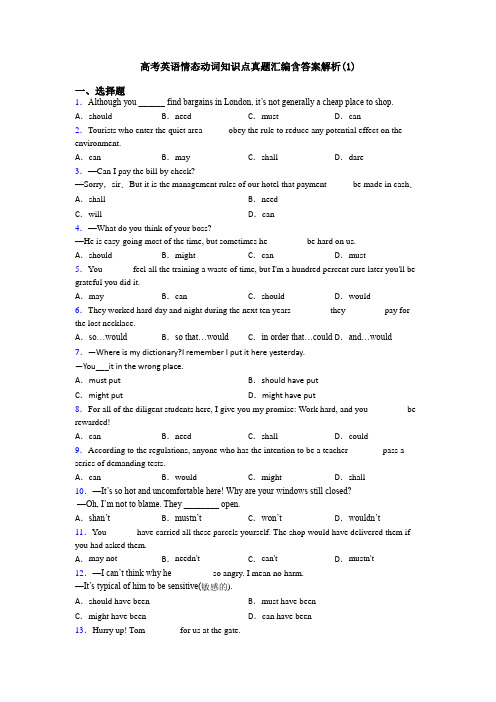
高考英语情态动词知识点真题汇编含答案解析(1)一、选择题1.Although you ______ find bargains in London, it’s not generally a cheap place to shop. A.should B.need C.must D.can2.Tourists who enter the quiet area _____ obey the rule to reduce any potential effect on the environment.A.can B.may C.shall D.dare3.—Can I pay the bill by check?—Sorry,sir.But it is the management rules of our hotel that payment _____ be made in cash.A.shall B.needC.will D.can4.—What do you think of your boss?—He is easy-going most of the time, but sometimes he ________ be hard on us.A.should B.might C.can D.must5.You ______ feel all the training a waste of time, but I'm a hundred percent sure later you'll be grateful you did it.A.may B.can C.should D.would6.They worked hard day and night during the next ten years ________ they ________ pay for the lost necklace.A.so…would B.so that…would C.in order that…could D.and…would 7.—Where is my dictionary?I remember I put it here yesterday.—You___it in the wrong place.A.must put B.should have putC.might put D.might have put8.For all of the diligent students here, I give you my promise: Work hard, and you ________ be rewarded!A.can B.need C.shall D.could 9.According to the regulations, anyone who has the intention to be a teacher _______ pass a series of demanding tests.A.can B.would C.might D.shall10.—It’s so hot and uncomfortable here! Why are your windows still closed?—Oh, I’m not to blame. They ________ open.A.shan’t B.mustn’t C.won’t D.wouldn’t 11.You ______ have carried all these parcels yourself. The shop would have delivered them if you had asked them.A.may not B.needn't C.can't D.mustn't12.—I can’t think why he________ so angry. I mean no harm.—It’s typical of him to be sensitive(敏感的).A.should have been B.must have beenC.might have been D.can have been13.Hurry up! Tom _______ for us at the gate.A.must wait B.must be waitingC.can be waiting D.must have waited14.It was so noisy that we hear ourselves speak.A.couldn’t B.shouldn’tC.mustn’t D.needn’t15.Mary is a bit shy and ____ a speech in public, which makes her lose the precious chance to do the voluntary job.A.dares not make B.doesn’t dare makeC.dare not to make D.dares not to make16.—I phoned you yesterday morning. A girl answered, but I didn’t recognize the voice.—Oh, it ________ my younger sister. She was in my room at that moment.A.must have been B.should have beenC.could have been D.may have been17.You ______ have been out last night, for all the lights in your room were not on.A.need B.must C.may D.should18.I still remember my happy childhood when my mother ___________ take me to Disneyland at weekends.A.might B.mustC.would D.should19.—I’m sorry, I ________ have been so rude to you that way.—Forget it, but I was a bit out of control yesterday.A.mustn’t B.shouldn’tC.couldn’t D.needn’t20.—Do you know where David is? I couldn’t find him anywhere.— Well. He ________ have gone far — his coat is still here.A.shouldn’t B.mustn’t C.can’t D.wouldn’t 21.The lady ________ have done something wrong, because she is looking guilty.A.would B.should C.can D.must22.The girl _________ out alone at night.A.dare not go B.dare not to go C.dares not go D.not dare go23.I _________ my driving test but I didn’t operate carefully.A.should pass B.may passC.might have passed D.might pass24.—Sorry, Mum! I failed the job interview again.—Oh, it's too bad. You________ have made full preparations.A.must B.can C.would D.should25.—I heard they went skiing in the mountains last winter.—It true because there was little snow there.A.may be not B.won’t be C.couldn’t be D.mustn’t be【参考答案】***试卷处理标记,请不要删除一、选择题1.D解析:D【解析】【分析】【详解】考查情态动词辨析。
高中英语高考语法易错知识点10.情态动词(考点梳理+易错点)
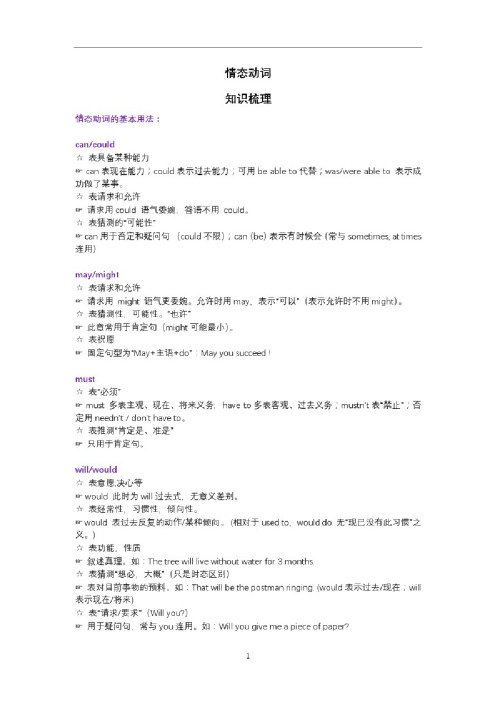
情态动词知识梳理情态动词的基本用法:can/could*表具备某种能力叱can表现在能力;could表示过去能力;可用be able to代替;was/were able to表示成功做了某事。
*表请求和允许叱请求用could语气委婉,答语不用couldo*表猜测的•可能性"吐can用于否定和疑问句(could不限);can(be)表示有时候会(常与sometimes,at times 连用)may/might*表请求和允许计请求用might语气更委婉:,允许时用may,表示•可以11(表示允许时不用might)。
六表猜测性,可能性。
"也许"叱此意常用于肯定句(might可能最小)。
六表祝愿吐固定句型为"May+主语+d。
":May you succeed!must*表“必须"wmust多表主观、现在、将来义务;have to多表客观、过去义务;mustrYt表噤止”;否定用needn't/don't have to。
介表推测。
肯定是、准是.吐只用于肯定句。
will/would六表意愿,决心等w would此时为will过去式,无意义差别。
六表经常性,习惯性,倾向性。
叱would表过去反复的动作/某种倾向。
(相对于used to,would do无"现已没有此习惯”之义。
)*表功能.性质叱叙述真理,如:The tree will live without water for3months.女表猜测11想必,大概•(只是时态区别)吐表对目前事物的预料。
如:That will be the postman ringing(would表示过去/现在;will 表示现在/将来)六表“请求/要求-(Will yoiP)用于疑问句,常与you连用。
如:Will you give me a piece of paper9shall(否:shan't)六表征求意见•…好不好.*用在第一、三人称°如:Shall the reporters wait outside or what9六表允诺、威胁、警告、命令或根据规定有义务做吐用于第二、第三人称。
高考英语情态动词和虚拟语气知识点总结

2021年高考英语情态动词和虚拟语气知识点总结情态动词是每年高考的热点也是难点,每年单项填空题必考一题。
考点集中在:情态动词表示估量的差不多用法及区别;情态动词否定式的用法辨析:“情态动词+have done”的用法区别等。
虚拟语气在高考命题中不是重点,然而难点。
考点常集中在含蓄条件句以及主语、宾语从句等特定句型中虚拟语气的使用上,因此考生应熟练把握含蓄条件句中主从句的时态要求以及一些典型句型中虚拟语气的具体形式。
虚拟语气考点透析考点一、虚拟语气的差不多用法1.与现在事实相反的虚拟语气,差不多结构为:主语+动词的一样过去时(be动词用were)+其他成分+if+should/would/could…+动词原形+其他成分。
例如:①If it were not for the fact that she ______ sing,I would invite her to the party.A.couldn’tB.shouldn’tC.can’tD.might not解析句意为:假如不是因为她可不能唱歌的事实,我会邀请她来参加那次聚会的。
that从句为同位语从句,描述的是事实,用陈述语气。
正确答案为C。
2.与过去事实相反的虚拟语气,差不多结构为:主语+动词的过去完成时+其他成分+if+should/would/could…+have done+其他成分。
例如:If the weather had been better,we could have had a picnic.But it ______ all day.A.rainedB.rainsC.has rainedD.is raining解析句意为:假如天气好的话,我们是能够去野餐的,然而下了一天的雨。
句子前半部分陈述的是与过去事实相反的情况,因此用了虚拟语气。
“下了一天的雨”是事实,因此用陈述语气。
因为是发生在过去的事实,因此正确答案为A。
3.与今后事实相反的虚拟语气,差不多结构为:主语+动词的一样过去时/should do/were to do+其他成分+if+should/would/could…+动词原形+其他成分。
高考英语情态动词(1)

4. shall; should 的特殊用法
D remain in their 1. It has been announced that candidates ____ seats until all the papers have been collected. (2002上海) A. can B. will C. may D. shall
此句的关键是后半句,“otherwise he would have phoned
me”,此处为省略了条件句的虚拟语气,表示“如果到了
他会打电话给我的”,由此可见,他肯定没到。 6. --- I stayed at a hotel while in New York. A with Barbara. (N 1998) --- Oh, did you? You______ A. could have stayed B. could stay
3. --- When can I come for the photos? I need them tomorrow afternoon. B --- They __________ be ready by 12:00. (N 1998) A. can B. should C. might D. need 此句应是店主对顾客的承诺。
高考英语之情态动词用法和虚拟语气知识点和范例
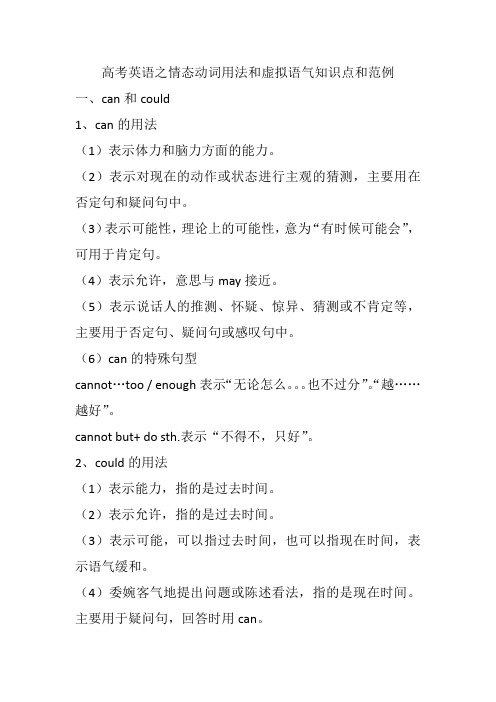
高考英语之情态动词用法和虚拟语气知识点和范例一、can和could1、can的用法(1)表示体力和脑力方面的能力。
(2)表示对现在的动作或状态进行主观的猜测,主要用在否定句和疑问句中。
(3)表示可能性,理论上的可能性,意为“有时候可能会”,可用于肯定句。
(4)表示允许,意思与may接近。
(5)表示说话人的推测、怀疑、惊异、猜测或不肯定等,主要用于否定句、疑问句或感叹句中。
(6)can的特殊句型cannot…too / enough表示“无论怎么。
也不过分”。
“越……越好”。
cannot but+ do sth.表示“不得不,只好”。
2、could的用法(1)表示能力,指的是过去时间。
(2)表示允许,指的是过去时间。
(3)表示可能,可以指过去时间,也可以指现在时间,表示语气缓和。
(4)委婉客气地提出问题或陈述看法,指的是现在时间。
主要用于疑问句,回答时用can。
3、can与could的区别can表推测时只用于否定句和疑问句(could无此限制)。
couldn't的可能性比can't小。
4、can与be able to的区别(1)现在时:无区别,但后者不常用。
(2)完成时;can没有完成时,此时要用have(has,had)been able to。
(3)将来时:can没有将来时,要用will be able to。
(4)过去时:could表示一般能力,was/were able to 表示在具体场合通过努力成功做成某事的能力。
二、may 和might1、may的用法(1)表示询问或说明一件事可不可以做。
(2)表示一件事或许会发生或某种情况可能会存在,通常用在肯定句和否定句中。
注意:表示可能性时,can't语气强,表示“不可能”,may not 语气弱,表示“可能不”。
2、might的用法(1)表示询问或允许,指的是过去时间。
(2)表示可能发生的事,可以指过去时间,也可以指现在时间,语气更加不肯定,可能性比may小一些。
高考英语考点归纳(三)—情态动词
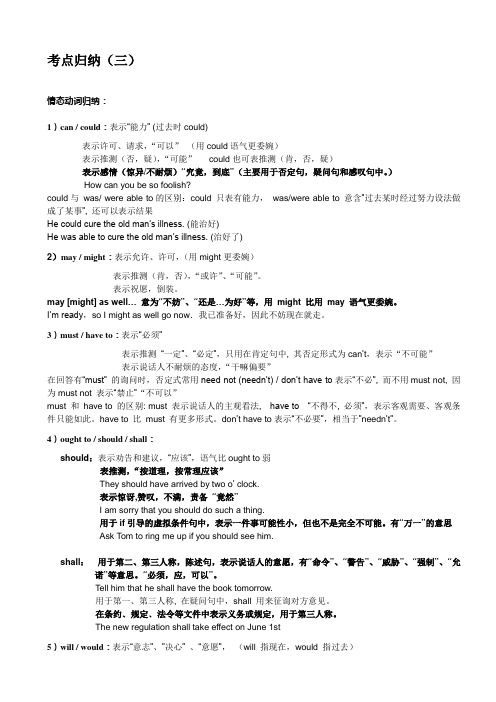
考点归纳(三)情态动词归纳:1)can / could:表示“能力” (过去时could)表示许可、请求,“可以”(用could语气更委婉)表示推测(否,疑),“可能”could也可表推测(肯,否,疑)表示感情(惊异/不耐烦)“究竟,到底”(主要用于否定句,疑问句和感叹句中。
)How can you be so foolish?could与was/ were able to的区别:could 只表有能力,was/were able to 意含”过去某时经过努力设法做成了某事”, 还可以表示结果He could cure the old man’s illness. (能治好)He was able to cure the old man’s illness. (治好了)2)may / might:表示允许、许可,(用might更委婉)表示推测(肯,否),“或许”、“可能”。
表示祝愿,倒装。
may [might] as well…意为“不妨”、“还是…为好”等,用might 比用may 语气更委婉。
I’m ready,so I might as well go now.我已准备好,因此不妨现在就走。
3)must / have to:表示“必须”表示推测“一定”、“必定”,只用在肯定句中, 其否定形式为can’t,表示“不可能”表示说话人不耐烦的态度,“干嘛偏要”在回答有“must” 的询问时,否定式常用need not (needn’t) / don’t have to表示“不必”, 而不用must not, 因为must not 表示“禁止”“不可以”must 和have to 的区别: must 表示说话人的主观看法, have to “不得不, 必须”,表示客观需要、客观条件只能如此。
have to 比must 有更多形式。
don’t have to表示“不必要”,相当于”needn’t”。
广东高职高考英语语法考点-情态动词

(2)作实义动词,有人称、时态、数的变化,后接不定式,在否定
句和疑问句中to可省略。
知识要点
He dare(情态V.) not ask the teacher questions.
如:He doesn't dare(行为V.) (to) ask the teacher questions. 他 不敢问老师问题。
情态动词
modal verb
Liu Ting
知识要点
知识点一 情态动词的定义 情态动词(modal verbs)本身有一定的词义,但是不能独立作谓语 ,只能和动词原形一起构成谓语。情态动词用在行为动词前, 表示说话人对这一动作或状态的看法或主观设想。情态动词虽 然数量不多,但用途广泛。情态动词主要有can (could), may (might), must, need, ought to, dare (dared), shall (should), will (would)等。 如:I can read this sentence in English. 我能用英语读这句话。 I can't read this sentence in English. 我不能用英语读这句话。
知识要点
【例3】 ________ you wait a few more minutes? It'll be your
turn soon.( )
A. Must B. Should C. Could
D. Might
答案 C
【解析】 本题考查情态动词的用法。在表请求或建议的句
型中一般用could。
知识点四 情态动词表推测的用法
,你们不必买。 (2)作实义动词(行为V.),有人称、时态、数的变化,后接带
高考英语情态动词用法总结(完整)
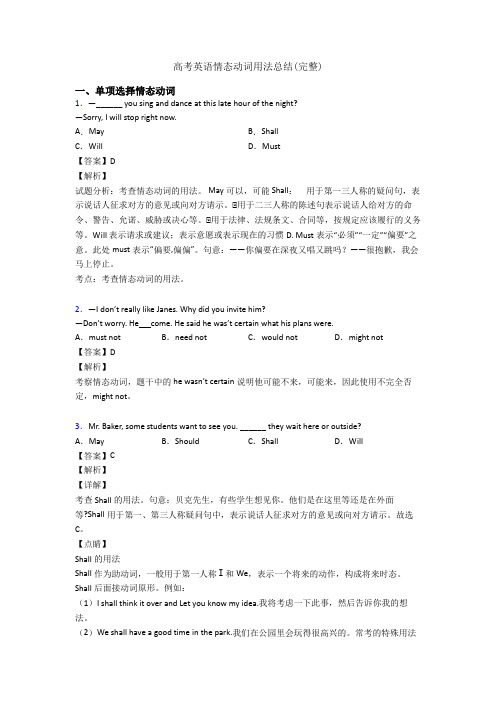
考查情态动词。句意:保罗在演讲比赛中表现得很好。他上星期一定练习了很多次。must have done是对过去发生的动作最有把握的猜测,意思是“一定”。故C选项正确。
6.Ann said whenever her father was unhappy he ________ go out and buy something, usually something large and useless.
9.he law is equally applied to everyone. No one _______ be above it.
A.shallB.must
C.mayD.need
【答案】A
【解析】
【详解】
考查情态动词。句意:法律面前人人平等。没有人能凌驾于法律之上。A. shall用于第二、第三人称,则含有命令、警告、允诺或威胁的语气。B. must(必须,一定)用于肯定句。C. may(可以,能够)表允许时一般不与第三人称连用。D. need (表示没有必要或询问是否有必要)需要;故选A。
(1)I shall think it over and Let you know my idea.我将考虑一下此事,然后告诉你我的想法。
(2)We shall have a good time in the park.我们在公园里会玩得很高兴的。常考的特殊用法
1. Shall用于第一人称,表示征求对方的意愿。如:What shall we do this evening?
8.— Excuse me, do you mind if I open the window?
— Well, if you__________. I can put on more clothes.
- 1、下载文档前请自行甄别文档内容的完整性,平台不提供额外的编辑、内容补充、找答案等附加服务。
- 2、"仅部分预览"的文档,不可在线预览部分如存在完整性等问题,可反馈申请退款(可完整预览的文档不适用该条件!)。
- 3、如文档侵犯您的权益,请联系客服反馈,我们会尽快为您处理(人工客服工作时间:9:00-18:30)。
高考英语最新情态动词知识点解析(1)一、选择题1.You ______ have been out last night, for all the lights in your room were not on.A.need B.must C.may D.should2.—Can I pay the bill by check?—Sorry,sir.But it is the management rules of our hotel that payment _____ be made in cash.A.shall B.needC.will D.can3.——I called you last night, but no one answered.——Sorry, I____________ sleeping.A.need have been B.would have been C.must have been D.should have been 4.For all of the diligent students here, I give you my promise: Work hard, and you ________ be rewarded!A.can B.need C.shall D.could5.If you behave well from now on, you ___ have an Apple Watch for your 18th birthday. A.will B.shall C.can D.must6.-Jenny took the 8:00 bus to Guangzhou this morning.-Really? He__the 9:00 train. It's much more comfortable and safer to travel by train. A.could have taken B.should takeC.must have taken D.can take7.—It’s so hot and uncomfortable here! Why are your windows still closed?—Oh, I’m not to blame. They ________ open.A.shan’t B.mustn’t C.won’t D.wouldn’t8.–Will you read me a story, Mummy?--OK. You ______have one if you go to bed as soon as possible.A.might B.must C.could D.shall9.Hurry up! Tom _______ for us at the gate.A.must wait B.must be waitingC.can be waiting D.must have waited10.It ___________ last night, for the road was very muddy.A.would have rained B.must have rained C.should have rained D.must rain 11.Sir, you ____ be sitting in this waiting room. It is for women and children only. A.shouldn’t B.will C.won’t D.needn’t 12.Tourists who enter the quiet area _____ obey the rule to reduce any potential effect on the environment.A.can B.may C.shall D.dare13.—You look so tired. You________ late last night.—Yes. I had to to do an important report and stayed up till I completed it.A.should sleep B.must sleepC.should have slept D.must have slept14.—May I smoke here?—If you _______, choose a seat in the smoking section.A.must B.should C.may D.can15.He didn’t follow the doctor’s suggestions as required, but he _________.A.ought B.ought to C.ought to be D.ought to have 16.–Do you know where David is? He is not in the office.–Well, he ______ have gone far—his coat is still here.A.shouldn’t B.mustn’t C.can’t D.wouldn’t 17.—I’m sorry, I ________ have been so rude to you that way.—Forget it, but I was a bit out of control yesterday.A.mustn’t B.shouldn’tC.couldn’t D.needn’t18.(2018·北京) In today’s information age, the loss of data _________ cause serious problems for a company.A.need B.shouldC.can D.must19.He ______ writing the paper now. He hadn’t written a single word when I left him ten minutes ago.A.shouldn’t be B.can’t have finishedC.can’t be D.mustn’t have finished20.Helen________ go on the trip with us, but she isn’t quite sure yet.A.shall B.may C.must D.can21.—Do you know where David is? I couldn’t find him anywhere.— Well. He ________ have gone far — his coat is still here.A.shouldn’t B.mustn’t C.can’t D.wouldn’t 22.The lady ________ have done something wrong, because she is looking guilty.A.would B.should C.can D.must 23.Although passing the driving test ________ be difficult now, it’s worth the efforts. A.need B.shallC.can D.should24.The heavy rain may ______ the landslide last night.A.accounts for B.accounted forC.have accounted for D.accounting for25.Mary is a bit shy and ____ a speech in public, which makes her lose the precious chance to do the voluntary job.A.dares not make B.doesn’t dare makeC.dare not to make D.dares not to make【参考答案】***试卷处理标记,请不要删除一、选择题1.B解析:B【解析】【详解】考查情态动词的用法。
句意:昨天晚上你肯定出去了,因为你房间的灯一整晚都没开。
A. need需要;B. must必须,肯定;C. may可能;D. should应该。
结合句意可知,本句考查对过去情况的肯定推测,其表达是must have done“肯定做了……”,故选B项。
【点睛】本句考查情态动词表推测的情况对现在的肯定推测must be/doThat must be my math teacher.那肯定是我的数学老师。
对现在的否定推测can't be/doYour answer can't be right.你的答案不可能是对的。
对过去的肯定推测must have doneIt must have rained last night, for the ground is wet.昨晚肯定下雨了,因为地面是湿的。
对过去的否定推测can't/couldn't have doneYou can't have taken part in the party, for he said he hadn't seen you.你不可能参加了聚会,因为他说他没有见过你。
2.A解析:A【解析】【分析】【详解】考察情态动词用法。
句意:——我能用支票付账吗?——对不起,先生。
但这是我们酒店的管理规定,支付要用现金。
shall可以表示命令,警告,强制,或者指规则和法律要求做的事情。
本题正是考察了shall表示按照规则和法律要求做的事情。
故A正确。
3.C解析:C【解析】【详解】考查情态动词+have done。
句意:——我昨晚给你打电话了,但没人接。
——对不起,我一定是睡着了。
这里在对过去的一件事情进行推测。
固定结构:must have done表示对过去事情有把握的肯定推测。
故选C。
4.C解析:C【解析】【详解】考查情态动词。
句意:对于在座的所有勤奋的学生,我向你承诺:努力工作,你将获得回报!分析句子可知,promise有承诺、许诺之意,shall可用于第二、第三人称,表许诺,故选C。
5.B解析:B【解析】【详解】考查情态动词。
